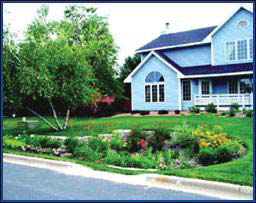|
Noticing a bit of hub-bub about rain gardens? The Venango Conservation District has been working to get the word out about rain gardens with news articles, mailings and educational events. The district has been awarded funding to build rain gardens for educational showcases and most recently to build rain gardens for property owners in the Lower Two Mile Run Watershed (Cranberry/Seneca area). Why you may ask?
To reduce nonpoint source pollution. Nonpoint source water pollution is pollution that comes from many different sources, even your back yard. Stormwater runs off impervious surfaces of your property (rooftops, paved driveways, sidewalks etc.). That stormwater run-off causes nonpoint source pollution by adding a large amount of stormwater entering your neighborhood waterway and causing erosion. That stormwater also picks up contaminates on its way to the stream, and so causes additional pollution problems. What is a rain garden? Rather than a traditional raised garden bed, a rain garden is a sunken garden. A ponding area is created and layers of gravel, sand, and a soil/sand mix are added. Then native perennials are. The garden will collect stormwater to allow it to infiltrate rather than run off. Compared to a patch of lawn, a rain garden allows about 30% more rain water to filter into the ground. What are the benefits of a rain garden? Environmental – a rain garden reduces nonpoint source pollution by collecting stormwater, filtering it and allowing it to infiltrate or evaporate. Rain gardens provide food and cover for wildlife. Maintenance – rain gardens reduce lawn area that needs to be maintenanced. Rain gardens themselves are easy and inexpensive to maintain. A rain garden reduces flooding and drainage problems.
3 Comments
1/25/2024 06:31:48 am
Tim Hortons, a popular restaurant in Canada, is known for its quality food and beverages. They have recently updated their customer feedback survey platform from Telltims.ca to telltims-can.com. By participating in the survey at https://telltims-can.com/survey/, customers have a chance to win a delightful Iced Coffee with Frenched Vanilla for only $1. This is an excellent opportunity for Tim Hortons enthusiasts to share their feedback and enjoy a delicious treat. Don't miss out on this golden chance!
Reply
1/25/2024 06:32:06 am
Tim Hortons, a popular restaurant in Canada, is known for its quality food and beverages. They have recently updated their customer feedback survey platform from Telltims.ca to telltims-can.com. By participating in the survey at https://telltims-can.com/survey/, customers have a chance to win a delightful Iced Coffee with Frenched Vanilla for only $1. This is an excellent opportunity for Tim Hortons enthusiasts to share their feedback and enjoy a delicious treat. Don't miss out on this golden chance!
Reply
Leave a Reply. |
CATEGORIESs
All
Archives
April 2024
|


